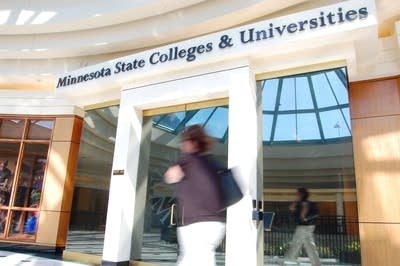Pawlenty says MnSCU credit transfer bill not necessary

More and more students are piecing together a college career that winds through multiple colleges.
That's why some students in the Minnesota State Colleges and Universities system are surprised when they face difficulties in transferring credits from one state college to another.
A bill passed by the Legislature this session aimed to fix that problem. But Gov. Tim Pawlenty vetoed the bill, saying the MnSCU is already working on the issue.
An increasing number of students begin their college careers the way Michael Jamnick did.
Create a More Connected Minnesota
MPR News is your trusted resource for the news you need. With your support, MPR News brings accessible, courageous journalism and authentic conversation to everyone - free of paywalls and barriers. Your gift makes a difference.
The St. Cloud State University senior started out taking classes in his hometown of Ely at Vermilion Community College.
"It was either go to school or work at the family grocery store," Jamnick said. "So I decided to go to school to get a jump on my college career right out of high school, to figure out where it was that I wanted to go."
After a year, Jamnick figured out he wanted to go to St. Cloud State University.
But not all the credits he earned at Vermilion Community College followed him.
When Jamnick transferred, he found the freshman English course he took in Ely didn't meet the requirements for the same class at St. Cloud.
"Had I known that wasn't going to transfer here, it was only worth pretty much half of what it was at St. Cloud State, I would have not spent the tuition and time on it," he said.
Jamnick had similar problems with a physical education course and a psychology class.
A legislative audit earlier this year found similar problems for many students in the MnSCU system. It said it was too difficult for students to transfer credits between MnSCU schools.
In response to that report, a bill was put together in the Legislature that pushed MnSCU to fix the transfer problems. It gave MnSCU five years to better align similar programs at colleges so credits could seamlessly transfer.
The bill also required MnSCU to do a better job explaining to students how to move from one state-run school to another without losing credits. It also required MnSCU to provide yearly updates on the system's progress over the next five years.
The measure easily passed the House and was unanimously approved by the Senate.
On Friday, Pawlenty vetoed the bill. In his veto letter, the governor said the legislation was unnecessary because MnSCU is already addressing the issue through policy changes.
"The veto was a big surprise," said Sen. Tarryl Clark, DFL-St. Cloud, one of the bill's authors.
Clark said even though MnSCU has promised to make credit transfers easier, she wants a deadline for MnSCU to fix the problem and legislation to hold them accountable.
"This is something we worked out with the MnSCU board, with students and with faculty. It's important to have more than a plan, we need to expect results," Clark said.
MnSCU officials say with or without legislation, credit transfers should be easier over the next few years.
Linda Baer, MnSCU senior vice chancellor for student affairs, said they are better communicating with students about which courses transfer, and which classes students should take if they want to move from a two-year to a four-year college.
"We think that it will get easier, because as students understand more of the process, and plan forward, and we give them more information to assist them, then they are going to accomplish more successful transfer patterns."
Baer also says most students don't know that they can appeal if they're told they can't transfer credits from one school to another.
Legislation forcing MnSCU to do a better job at fixing the transfer credit problem could find its way to Pawlenty's desk again.
A similar measure is in a higher education bill that's making its way through the Legislature.
